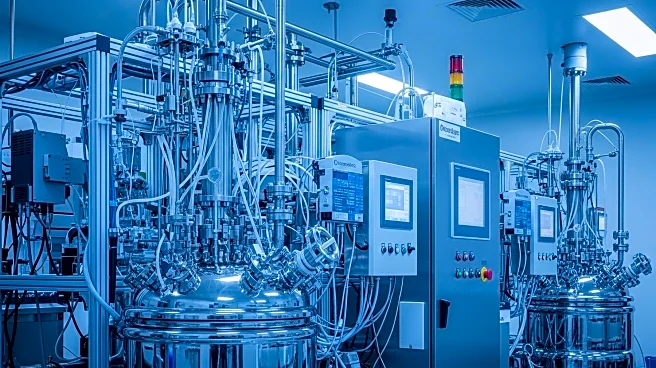What's Happening?
Thermo Fisher Scientific, a global provider of scientific instrumentation and services, is addressing bottlenecks in downstream bioprocessing, particularly in purification and quality control (QC) testing. These bottlenecks often arise from complexities in speed, workforce availability, material flow, and equipment performance. Dexter Evans, Vice President of Global Operations at Thermo Fisher, emphasizes the importance of identifying and resolving these bottlenecks to maintain process flow. The company employs strategies such as value stream mapping (VSM) and lean management to optimize processes and reduce waste. By transitioning from batch-based approaches to dynamic, team-driven models, Thermo Fisher aims to increase throughput and improve coordination with quality testing.
Why It's Important?
Addressing bottlenecks in bioprocessing is crucial for the efficient production of biotherapies, such as gene therapy and RNA vaccines. These therapies rely on high-quality plasmid DNA, which requires effective purification processes. By improving these processes, companies like Thermo Fisher can enhance product recovery rates, reduce costs, and ensure the delivery of safe and effective therapies. This has significant implications for the healthcare industry, as it can lead to faster and more cost-effective production of critical medical treatments. Stakeholders in the bioprocessing industry, including manufacturers and healthcare providers, stand to benefit from these advancements.
What's Next?
Thermo Fisher and other bioprocessing companies are likely to continue refining their processes to further reduce bottlenecks. This may involve adopting new technologies and methodologies to enhance purification efficiency and product quality. As the demand for biotherapies grows, companies will need to ensure their supply chains are robust and capable of meeting increased production needs. Ongoing collaboration with suppliers and continuous process improvement will be essential to maintaining efficiency and meeting industry demands.
Beyond the Headlines
The efforts to address bioprocessing bottlenecks also highlight the importance of innovation and adaptability in the biotechnology sector. As new therapies are developed, the industry must remain agile to accommodate evolving production requirements. This underscores the need for a skilled workforce and investment in research and development to drive technological advancements. Additionally, the focus on reducing bottlenecks aligns with broader industry trends towards sustainability and cost-effectiveness, which are increasingly important in the competitive global market.









